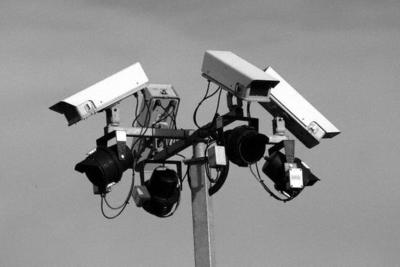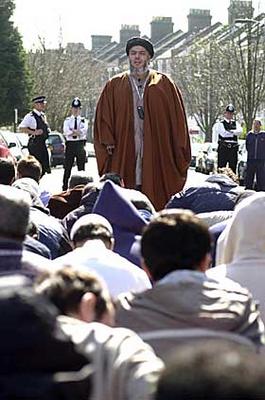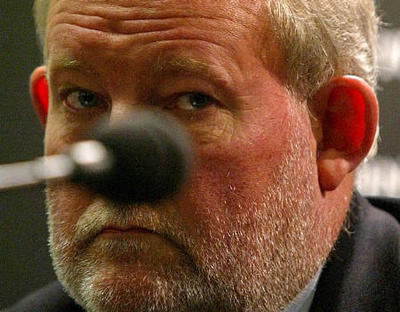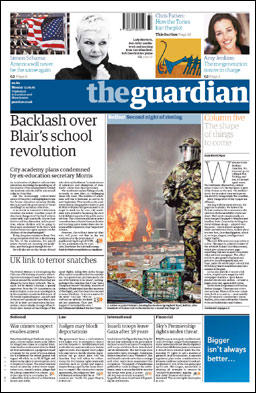Taking the piss - CCTV installed in school toilets.

Parents have protested to Ruth Kelly, the education secretary, after security cameras were installed in a secondary school's lavatories.
Staff at Westhoughton High, near Bolton, Lancashire, say the measure is necessary to combat vandalism, smoking and drug-taking.
But more than 80 parents have signed a petition demanding the removal of the CCTV cameras, and have asked Ms Kelly to intervene.
One parent, Carol Galloway, described the move as "an invasion of privacy". Bolton council said the school was seeking to "reassure parents about why it is necessary to have cameras in place".
Just imagine for a second that this wasn't in a school. Say it was in a busy shopping mall. The security and management of the mall installed CCTV in the toilets because they said that vandalism, smoking and drug-taking occurred in there. Not only would there be universal outrage, those behind the scheme would possibly get sacked and for good reason. While Britain has taken the constant surveillance of nearly every street in the country in its stride, I can't imagine anyone daring to defend putting CCTV in toilets.
That the school has decided to take such a measure shows how obviously disconnected the leadership of the school is from its own pupils. Any teacher will tell you that if you respect your students, they will respect you. This measure removes any notion of that. Instead of taking the option of positioning a member of staff near the toilets, who could monitor how long people were in there and possibly what they had been doing, they've decided to install a constant monitor of exactly what they're doing in probably the one place that most people consider to still be private.
That it's none of the school's business if the kids are smoking is obviously irrelevant. I never saw the point when I was at school of punishing children for smoking. It was their decision, they knew perfectly well what they were doing. They could have informed the child's parents if they caught them doing it. Instead they put them on "report", constantly monitoring the child's behaviour even if it was exemplary, and gave detentions. That this was completely hypocritical as it was well-known that many teachers smoked on school property didn't matter. Drug-taking is a different matter if it is occurring on school property. I only ever witnessed people smoking weed or coming back to lessons completely stoned, and they caused little harm generally. That said, drug taking and possession/selling is obviously more heinous than simple smoking. It needs to be dealed with. Unfortunately, the government is currently encouraging random testing, even though it's a private matter if it doesn't happen at school. The invasion of those at school's privacy climbs year on year, as more schools also adopt random searching for weapons.
I always felt that school was simply a lesser form of a totalitarian dictatorship. You had little say in any of the matters of running the school. Mine had a "student council" which relied on elections, which were blatant popularity contests. It didn't matter if those elected were too shy or idiotic to even take notes or then stand up in front of the class and say what happened. This was democracy in action.
Another thing that annoyed me was the hypocrisy of some of the teachers - the typical kind who demanded you take off your coat in the dead of winter while they sat there in theirs, sipping hot tea from their mug with a daft slogan on it. The many who always considered you guilty until proven innocent, for whatever misdemeanors which may have occurred. The humiliating experience of having to go and a piece of paper saying what time you had arrived if you were so much as two minutes late. This time was then how long you would spend in detention, added up over the week. This is not to say that schools are full of little angels who obey every command. Mine was full of uncooperative shits who would have tested the patience of Ghandi. It's simply that some teachers came in who already had a trench warfare mentality; that treating you like dirt would somehow make you fear them. It didn't work, and never has. Most of the above is simply counter-productive.
This installation of CCTV is from a similar school of thought. It ignores that students sometimes use toilets as havens as well as places to smoke, roll joints and throw wet toilet paper at the ceiling. Some would sit in there at lunchtime to be alone or avoid other people. I never did that, but I often left the school when I didn't have a lesson and went and sat in nearby public toilets. I could read in peace without anyone bothering me. As Michael Moore said in Bowling for Columbine, it sucks being a teenager and it sucks having to go to school. When schools treat you as a threat rather than as someone to teach, what do they honestly expect?






